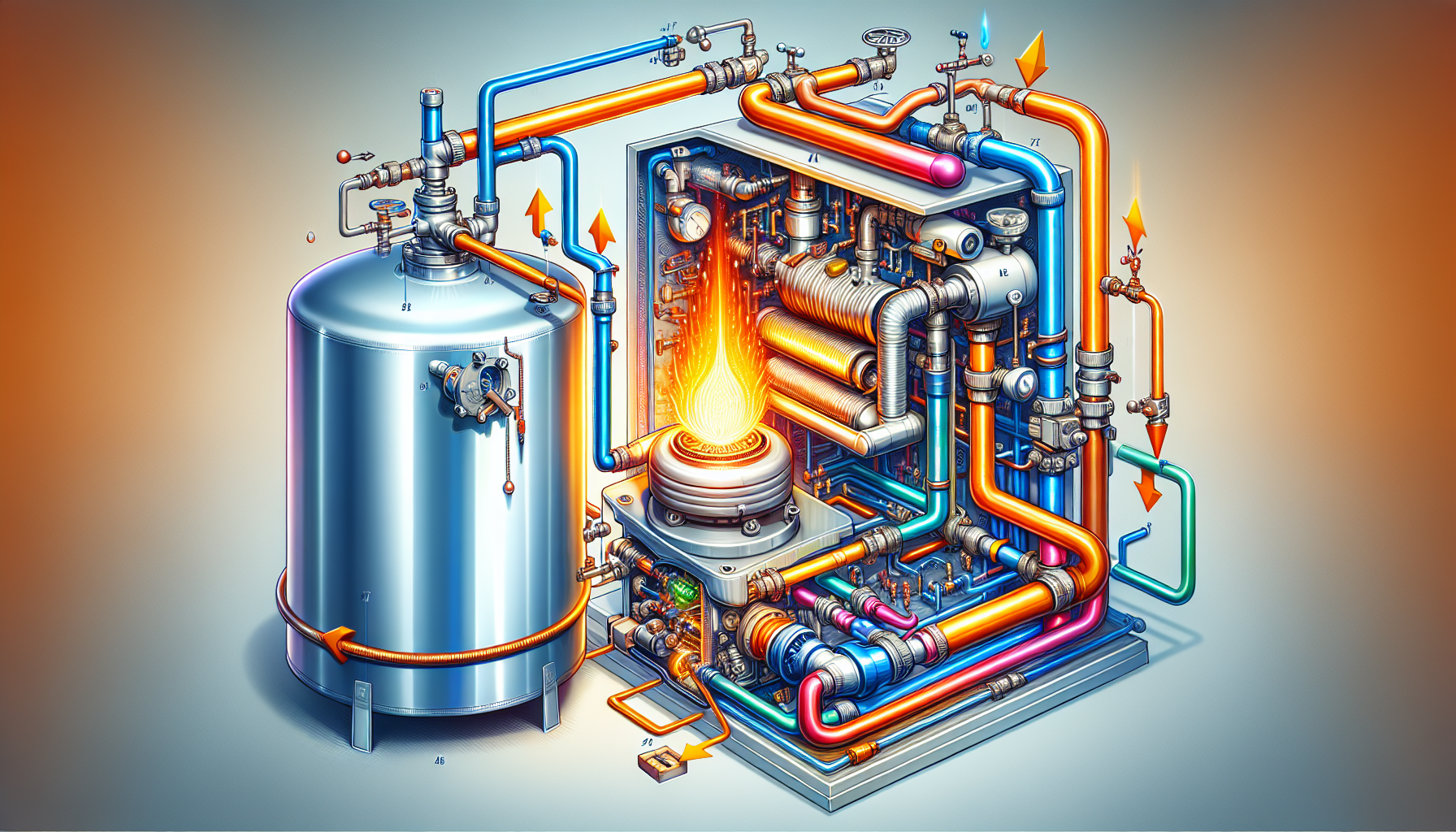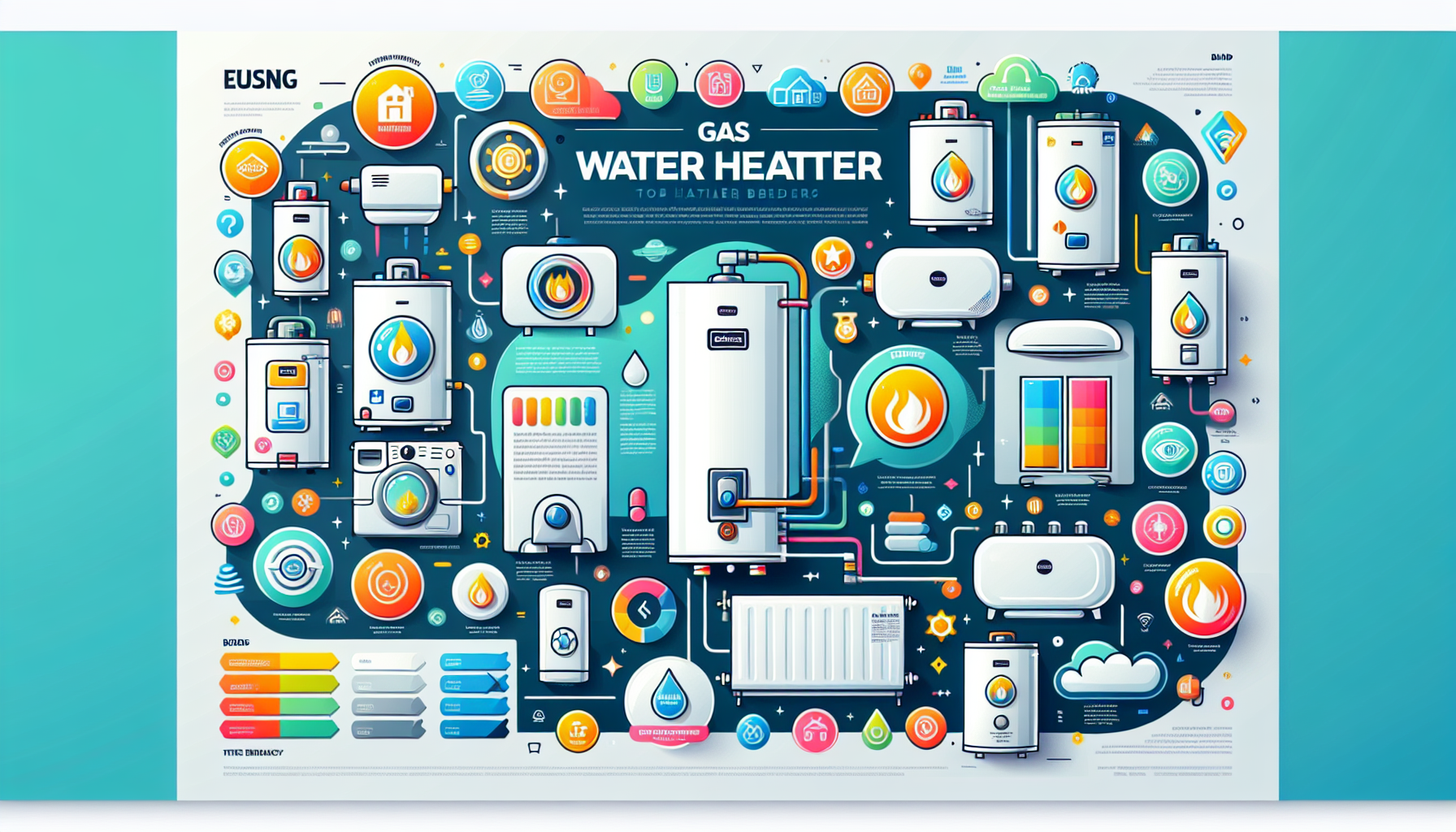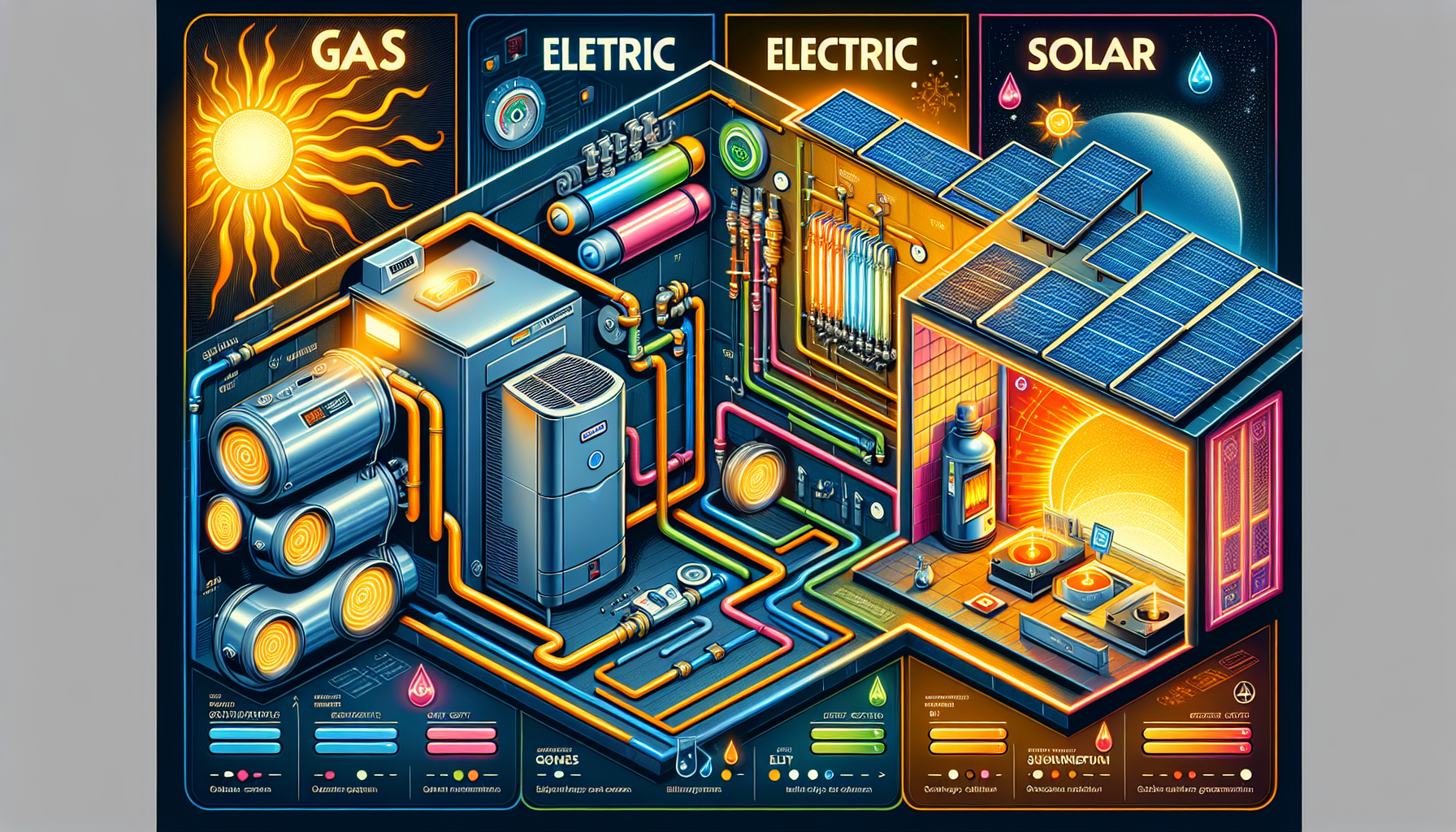Top Gas Water Heating System Options for Your Home
Need efficient hot water? A gas water heating system might be what you need. This article covers how gas water heaters work, their benefits, and guides you in choosing the right one for your home.
Key Takeaways
-
Gas water heating systems provide efficient and cost-effective hot water solutions, using natural gas to heat water on demand and reduce energy waste.
-
Choosing the right gas water heater depends on factors like household size, hot water usage, and efficiency ratings, with options including storage, instantaneous, hybrid, or solar-compatible systems.
-
Regular maintenance and professional installation are crucial for the performance and longevity of gas water heaters, ensuring safety and efficiency.
Understanding Gas Water Heating Systems

Gas water heating systems use natural gas to heat water for homes or businesses, offering efficiency and lower operational costs compared to electric water heaters. These systems typically use a gas burner to heat water in a storage tank or via a continuous flow system, catering to different household needs.
How Gas Water Heaters Work
Gas water heaters are designed to efficiently heat water using a gas burner located at the bottom of the unit. Turning on the hot water tap activates a flow sensor, which ignites the gas burner to heat water as it passes through a heat exchanger. This method ensures that water is heated only when needed, avoiding the energy waste associated with constantly heating a tank of water.
This on-demand heating not only conserves energy but also provides a continuous supply of hot water, making it a reliable choice for households with varying hot water usage. Gas water heaters provide quick and efficient hot water, whether for multiple outlets or a single tap.
Types of Gas Water Heating Systems
Gas water heating systems can be categorized into storage systems and instantaneous models, each catering to different household needs. Storage gas water heaters are suitable for larger households with high hot water demands, storing heated water in tanks for immediate use. However, one disadvantage of storage systems is the potential for high heat loss, particularly in colder climates.
On the other hand, instantaneous (tankless) gas water heaters provide endless on-demand hot water, making them ideal for smaller households or those with lower hot water usage. The main difference between storage and instantaneous systems is that storage systems heat water in a tank, while instantaneous systems heat water on demand, offering more energy efficiency.
For those looking to combine the best of both worlds, hybrid options that blend gas and electric sources can enhance efficiency and provide faster heating times. These systems are designed to optimize energy use and ensure a continuous supply of hot water.
Benefits of Choosing a Gas Water Heating System

Choosing a gas water heating system offers several benefits, including high energy efficiency and lower operational costs. Gas water heaters utilize a sensor-activated gas burner to heat water as it flows, ensuring a constant supply of hot water without wasting energy.
Additionally, continuous flow gas hot water unit reduces energy consumption and subsequently lower utility costs.
Energy Efficiency and Cost Savings
Energy-efficient models can boast up to a 7-Star energy rating, indicating superior efficiency and lower running costs. For instance, the Rheem Metro Series includes models that achieve a 6-star energy efficiency rating, providing a competitive alternative to traditional electric hot water heaters. High-efficiency gas water heaters are usually the most cost-effective option when fueled by natural gas, as they can be up to four times more efficient than conventional models.
Heating water to the desired temperature rather than maintaining high temperatures, gas water heating systems significantly reduce heating requirements and energy bills. This results in substantial long-term savings on utility bills, making them an attractive option for energy-conscious homeowners.
Environmentally Friendly Options
Though gas storage hot water systems emit minimal greenhouse gases, they still contribute to carbon emissions. However, using instant gas water heaters can lower greenhouse gas emissions compared to electric systems. Natural gas water systems are also preferred in homes because they are space-saving, have a long lifespan, provide cleaner water, and experience less bacterial growth.
The environmental impact of your hot water system can influence budget decisions. Opting for more environmentally friendly options, such as instant gas heaters or solar-compatible systems, can reduce your carbon footprint and contribute to a more sustainable home.
Selecting the Right Gas Water Heater for Your Home
Selecting the right gas water heater involves assessing your household’s hot water needs and energy efficiency ratings. Consider factors such as household size, hot water usage, available space, budget, and environmental impact to determine the most suitable system for your home.
Assessing Household Hot Water Needs
Gas storage system typically suit larger households with high hot water demands. The number of bathrooms and occupants in a household significantly impacts the hot water demand. In colder climates, households typically require more hot water capacity to meet their needs.
Instantaneous gas water heaters are designed for smaller homes and provide hot water as needed without the need for storage. Large families benefit from on-demand hot water, ideal for long showers or frequent visitors.
When selecting a gas hot water system, consider your household size and hot water usage. Additionally, take into account available space, budget, energy efficiency ratings, and environmental impact. Consider future household changes to ensure the system meets long-term needs.
Budget Considerations
Understanding the costs of gas storage hot water systems is crucial for budget alignment. Gas water heaters usually have lower initial costs than electric and solar systems, but consider the total cost of ownership, including installation and long-term running costs.
Though initial costs might be higher for newer technology, long-term savings on energy bills make gas water heaters more cost-effective. Evaluate the running costs, lower running costs, and potential long-term savings to ensure you’re making a financially sound decision.
Installation and Maintenance of Gas Water Heating Systems

Proper installation and regular maintenance are vital for optimal performance of gas water heating systems. These steps ensure safety, efficiency, and longevity of the system.
Professional Installation Requirements
Hiring a licensed gas fitter prevents installation errors and ensures safety. Gas hot water systems must be installed by a licensed gas fitter for compliance with safety standards and to avoid potential hazards.
Regular Maintenance Tips
Regular maintenance ensures your gas water heater operates efficiently. Common indicators that a gas water heater needs attention include unusual noises, discoloration, slow heating, or insufficient hot water. Scheduling regular maintenance checks every two years helps identify issues early and avoids costly repairs.
Regular maintenance tasks include annual inspections of the anode rod and regular draining of the system to prevent sediment accumulation, which can lead to discoloration and affect heating efficiency. Addressing noisy operation, often caused by mineral build-up or a malfunctioning thermostat, is essential for maintaining the efficiency and longevity of gas water heaters.
Top Brands and Models of Gas Water Heaters

Rinnai, Bosch, and Rheem are recognized as leading brands of gas water heaters, known for their innovative features and reliability.
Models such as the Rinnai B-Series, Rheem Metro Series, and Rinnai Infinity Series are top choices in 2024 for their energy efficiency and performance.
Rinnai Gas Water Heaters
Rinnai gas water heaters are known for their compact design and high efficiency. The Rinnai B26 model, for instance, delivers a hot water rate of 26 liters per minute, making it suitable for small to medium-sized households. The compact yet high-performance configuration of the B26 model ensures it fits well in various home setups while efficiently transferring heat to the water through its heat exchanger.
Rinnai’s Infinity Series provides continuous flow hot water and reduces energy consumption by heating water only when needed. These models are ideal for households seeking reliable and efficient hot water solutions.
Bosch Gas Water Heaters
Bosch gas water heaters feature advanced temperature controls and innovative hydropower ignition solutions, ensuring stable temperature output and enhanced efficiency. These features make Bosch models a dependable choice for homes with varying hot water usage needs.
Rheem Gas Water Heaters
Rheem’s range of gas water heaters emphasizes energy efficiency and safety. Designed to reduce utility costs, these models are built to last, offering a lifespan that often exceeds that of traditional water heaters. Rheem’s commitment to safety is evident in their features, which include flame arrestors and pressure relief valves to prevent overheating and potential hazards.
For indoor use, Rheem offers models like the 135L and 170L, catering to different household needs. These models are known for their durability and ability to provide a continuous supply of hot water, making them a reliable choice for various home environments.
Comparing Gas, Electric, and Solar Water Heating Systems

When choosing a water heating system, it’s essential to compare gas, electric, and solar options to find the best fit for your home. Each type has its advantages and drawbacks, depending on factors like energy efficiency, running costs, and environmental impact.
Efficiency and Running Costs
Gas water heating systems usually incur lower annual operating costs than electric systems. Gas instantaneous water heaters, for instance, have operational costs that decrease as household usage increases due to a declining block tariff structure. While gas hot water systems are expected to become the most expensive option by 2030, their current efficiency and lower running costs make them a popular choice.
The operating costs for gas-boosted solar hot water systems range from $4950 to $6550, demonstrating their potential for long-term savings. These systems combine the benefits of solar energy with the reliability of gas, ensuring a continuous supply of hot water while minimizing energy bills and reducing the carbon footprint.
Environmental Impact
Adopting solar water heating systems can significantly reduce carbon dioxide emissions. This highlights their positive impact on the environment. Although solar hot water systems may have high upfront costs, they lead to lower running expenses over time, making them a valuable investment for eco-conscious homeowners.
Gas hot water systems produce more greenhouse gas emissions than solar hot water systems. However, they are still considered more environmentally friendly than electric systems. Despite environmental concerns, natural gas remains popular due to its lower operational costs compared to electricity.
Cost Considerations for Gas Water Heating Systems
When evaluating gas water heating systems, it’s crucial to consider both upfront and long-term costs. While initial expenses might be higher for advanced technology, the potential for long-term savings and efficiency gains can make these systems a sound investment.
Upfront and Installation Costs
Gas water heaters generally have lower upfront costs compared to electric and solar systems. Prices for gas storage hot water systems vary based on quality, warranty, and efficiency, with installation expenses ranging from $1,500 to $3,000. Replacing an existing gas hot water system typically costs between $500 and $800, making it a relatively affordable upgrade.
Understanding these costs is essential for budgeting and planning. While same-day installation services are available, it’s vital to ensure that the installation is performed by a licensed professional to avoid potential hazards and ensure compliance with safety standards.
Long-Term Savings
Gas systems generally cost less in the long term due to their efficiency and longevity. These systems often last up to 20 years, providing reliable hot water and reducing the need for frequent replacements.
Integrating gas boosters with solar systems can substantially reduce energy costs over time, enhancing the financial benefits of gas water heaters.
Enhancing Efficiency with Hybrid and Solar-Compatible Systems
Hybrid and solar-compatible gas water heating systems maximize energy efficiency and reduce environmental impact. These innovative solutions combine the benefits of traditional systems with renewable energy sources, offering significant energy savings and lower running costs.
Hybrid Gas Water Heaters
Hybrid gas water heaters combine traditional tank systems with heat pump technology, utilizing ambient air for heating and offering substantial energy savings. These systems can adjust their heating method based on demand, optimizing energy use and reducing utility bills. For households looking to balance efficiency and performance, hybrid gas water heaters provide an excellent solution.
Leveraging both gas and electric power, hybrid systems maintain a continuous supply of hot water while minimizing energy consumption. This dual approach enhances overall efficiency and supports sustainable energy use, making hybrid gas water heaters a smart choice for modern homes.
Solar-Compatible Gas Water Heaters
Solar-compatible gas water heaters integrate with solar panels, allowing homeowners to harness renewable energy for their heating needs. These systems typically have lower long-term operating costs due to their reliance on sunlight, making them an eco-friendly and cost-effective option. Factors such as climate and sunlight availability can affect efficiency, but gas boosters ensure a continuous supply of hot water regardless of weather conditions.
Electric heat pump systems, when paired with solar panels, offer significant energy savings by benefiting from reduced energy tariffs and harnessing solar power. This combination not only reduces energy bills but also minimizes the carbon footprint of your home, contributing to a more sustainable future.
Troubleshooting Common Issues with Gas Water Heaters
Troubleshooting common issues with gas water heaters is essential for maintaining consistent performance and preventing significant problems. Common signs that a gas hot water system needs maintenance include noisy operation, rusty or discolored water, slow heating, cold water output, and fluctuating temperatures.
Noisy Operation
Banging or rumbling noises often stem from sediment buildup in the tank, which can affect heating efficiency. A high-pitched screeching sound can indicate loose valves that need adjustment to prevent air leaks. To address these issues, draining the water heater can resolve problems caused by sediment buildup, while adjusting loose valves can help eliminate high-pitched screeching sounds.
Addressing noisy operation is essential for maintaining the efficiency and longevity of gas water heaters. Regular maintenance and timely interventions can prevent these issues from escalating, ensuring your system runs smoothly.
Inconsistent Water Temperature
Inconsistent water temperature can be caused by factors such as sediment build-up, which can impede the water heating process and lead to fluctuating temperatures. Another common cause is a faulty thermostat that may not accurately control the temperature of the heated water.
To troubleshoot inconsistent water temperatures, ensure that the gas supply is consistent and check for any leaks or blockages in the system. Regular maintenance, such as flushing the tank and inspecting the thermostat, can help maintain the perfect temperature for your hot water needs.
Rusty or Discolored Water
Rusty water can be a sign of corrosion within the tank or pipes, often requiring inspection or replacement. The presence of rust or discoloration in water from gas heaters can indicate the need to inspect and possibly replace the anode rod or the entire tank if the corrosion is severe.
If discolored water is detected, homeowners should conduct a thorough inspection of the system and consider professional assistance to determine the best course of action. Regular maintenance and timely replacement of components can ensure reliable hot water and prevent further issues.
Summary
In conclusion, gas water heating systems offer numerous benefits, including energy efficiency, lower operational costs, and reliable hot water supply. By understanding how these systems work, assessing your household’s needs, and considering budget and environmental factors, you can select the right gas water heater for your home. Regular maintenance and choosing the right model from top brands like Rinnai, Bosch, and Rheem will ensure your system operates efficiently for years to come.
Frequently Asked Questions
What are the main types of gas water heating systems?
The main types of gas water heating systems are storage tank systems, instantaneous (tankless) models, and hybrid options that utilize both gas and electric sources. Each option provides unique advantages depending on your needs and preferences.
How do gas water heaters compare to electric water heaters in terms of energy efficiency?
Gas water heaters typically offer greater energy efficiency and lower operational costs than electric water heaters. This makes them a more economical choice for many consumers.
What are the benefits of choosing a gas water heating system over a solar system?
Choosing a gas water heating system offers reliable hot water supply and generally lower upfront costs than solar systems, making it a practical option, especially in regions with limited sunlight.
How often should I maintain my gas water heater?
You should maintain your gas water heater every two years, ensuring annual inspections of the anode rod and regular system draining for optimal performance.
What should I do if my gas water heater produces rusty or discolored water?
If your gas water heater produces rusty or discolored water, it’s essential to inspect the system as this may indicate corrosion. Replacing the anode rod or consulting a professional can help resolve the issue effectively.


























